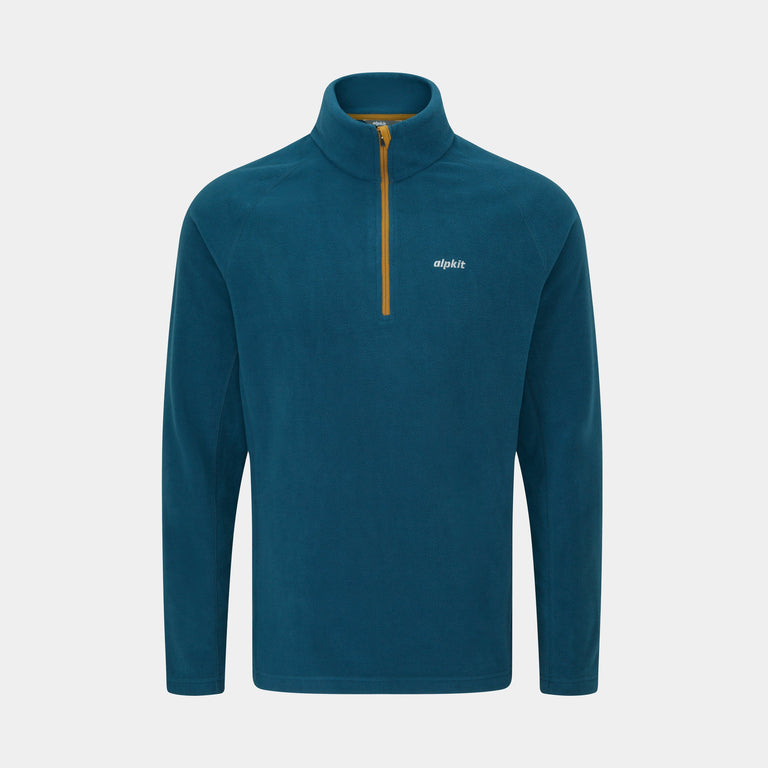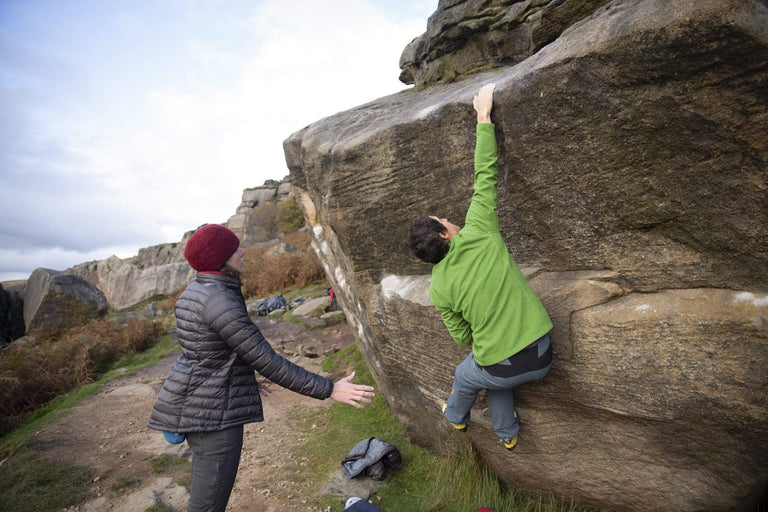
A good midlayer regulates heat and moisture on the hill. Learn what to consider - , fabric, conditions - and find your perfect fleece or wool layer.
Neither here or there. The in-between spaces can be awfully difficult to define. And that's just great because the outdoors doesn't respect definitions.
Waterproofs keep the rain off, baselayers wick moisture away from your skin but what do you wear in-between and what happens when you take your coat off? Is your midlayer now an outerlayer and does it even matter?
The perfect feeling of comfort
So you have made it up to that windswept ridge. Your friend (not you) has slogged to get there and now his sweat-soaked cotton shirt clings to his skin, making him shiver. He zips open his windshell and takes the full impact of the icy wind. Quickly zipping up his jacket he is now wet and cold.
Your friend is someone who sadly hasn't paid any attention to the principles of the layering system. You know it doesn't have to be this way.
Picture yourself instead, warm and dry, with a steady body temperature. Your clothing breathes, wicking away sweat while keeping you insulated. You're able to focus on the stunning views, the joy of the walk, tending to the discomfort of your friend.
The midlayer: your comfort essential
A midlayer is a key part of your hillwalking clothing system. It sits, sandwiched between your base layer and outer layer, regulating your body temperature and enhancing your comfort. It's not just about adding warmth; it's also about managing moisture and providing flexibility.
Real-world factors affecting comfort
Comfort in the hills isn't just about staying warm. It’s a balance of many factors:
Environment: The terrain and altitude can affect how much you sweat and how quickly you cool down.
Weather: Wind, rain, and temperature can all change dramatically during the course of your walk and can make a big difference in your level of comfort.
Intensity: You heat up when you climb a hill or pick up the pace to get the last bus home. You cool down when you stop for snacks or walk with a slower partner. For any given route your intensity level should influence what you wear.
Carrying rucksacks: A heavy rucksack, even with the best back system in the world will make you sweat more. The straps are going to compress your clothing, reducing the effectiveness of your midlayer to insulate and breathe. Midlayers frequently have zips, pockets, bells and whistles that may interfere with straps on your rucksack.
Season: Some may argue that we don't have seasons in the UK, but in general winter and summer represent our two extremes. Winter will be colder, with less sunlight. You will be wearing your midlayer more often than stuffing it into your rucksack so packability may be less important than it would be in summer.
Fit: A midlayer that’s too tight can restrict movement and breathability, while one that's too baggy is not going to insulate effectively. It can be really tricky because sometimes you might want to wear your midlayer as a baselayer, sometimes it might be your outerlayer. Such is the fun of pursuing comfort in the outdoors!
Duration: Longer walks in the mountains mean more time for sweat to cool on your skin if your layers aren’t managing moisture properly. If you are on a multi-day adventure this is going to accumulate and leave your fleece wet and uncomfortable.
The benefits of getting your midlayer right
When you get your layering system right everything flows. Sitting smack bang in the middle of it all, your midlayer plays a large role in transmission and insulation. Technical midlayers can prevent overheating and chilling, reduce sweating, and improve your overall hillwalking experience.
Midlayers for comfortable hillwalking
A good midlayer is an essential part of your layering system. It should provide warmth without bulk, be breathable, packable and flexible enough for conditions on the hill. Here’s what to consider:
Materials we use for our midlayers:
- Fleece: A rather generic term covering a wide range of synthetic fabrics developed as an alternative to wool. Provides excellent breathability, dry quickly and insulates well, even when wet. Ideal for variable weather.
- Merino wool: Naturally breathable and moisture-wicking, perfect for a range of conditions but less durable unless blended with synthetic yarns.
Environmental considerations: Whether choosing a synthetic based fibre or a natural fibre like wool there are eco-friendly practices that reduce your impact. Fleeces made from recycled plastics and designed to be recyclable, wool that has been gathered using humane farming methods. If you look through our product range you will find accreditation from organisations such as the Global Recycled Standard, Responsible Wool Standard, Better Cotton Initiative and the Global Organic Textiles Standard.
Sourcing is just part of the story, keeping your garment going stronger, longer is even more important. We have repair stations in our stores and work hard to keep unwanted kit in circulation through our Continuum programme.
Our midlayer solutions for hillwalking
We have developed a range of midlayers designed to keep you comfortable while hillwalking:
- Sastrugi: Heavy weight, 100% recycled pile fleece jacket for maximum warmth through the winter.
- Laika: Lightweight micro fleece or 1/2 zip heavyweight base layer. Polygiene(R) treated to naturally stay fresh. 100% recycled fabric.
- Keeshond: Exceptionally warm, cosy and breathable midlayer for cold weather activities. Lightweight high loft fleece and grid fleece panels with Polygiene(R) anti-odour this grid fleece delivers amazing warmth without excess weight and bulk.
- Loki: Quick-drying and highly breathable soft fleece fabric with Kangaroo hand warmer pocket. Made with 100% recycled fabric.
- Woodsmoke: An innovation in mountain shirts. Made from ThermoTech(R) polyester with hollow core fibres that trap more air to give you more insulation. It has a higher warmth-to-weight ratio, making it an ideal mid layer.
What can I say about the Woodsmoke that hasn't already been said before. I got my first one in 2018 and it still looks and feels as good as it did back then. I now have 4 in different colours, and I'm waiting for an in-stock notification for my 5th! I haven't yet found a pursuit that the Woodsmoke isn't good for. I guess I'd take it off for swimming? - Jon
Wool Jumpers
- Brenin: 100% natural, biodegradable and ethically sourced merino wool. Naturally warm, breathable and odour resistant, this chunky knitted jumper is designed for movement with a fitted style and ribbed edges.
New for Autumn 2025:
- Pennine (Mens): Made in the UK from 100% British wool in its natural undyed colour. Seamless construction prevents rubbing under pack straps, making it ideal for long days with a rucksack. Classic fit works as an outer layer or under a shell. A lower carbon footprint jumper that supports British textile industries.
- Iona (Womens): Made in the UK from undyed British wool with a relaxed roll neck fit. Perfect for layering on winter walks and bothy nights. Like Pennine, it’s manufactured locally with minimal processing for a lighter environmental impact.
- Norge (Mens): Classic half-zip design in 100% RWS certified wool with moss knit yoke for extra breathability. Versatile temperature regulation for changeable mountain conditions - dump heat on the climb, seal in warmth at the summit.
- Stora (Womens): Fair Isle patterned pure wool jumper made from RWS certified wool. Raglan sleeves give freedom of movement while the slightly boxy fit layers easily. Subtle Scandi-inspired design meets technical midlayer performance.
- Rago (Womens): Contrast moss stitch yoke adds texture and breathability to this modern, boxy-fit wool jumper. 100% RWS certified wool that’s as comfortable on the trail as it is at the bothy.
Heritage favourites in new colours:
Supporting British Wool & Manufacturing
Our new Pennine and Iona jumpers are made in the UK from 100% British wool. By sourcing and manufacturing locally, we reduce transport emissions while supporting British farming and textile communities. The undyed yarn celebrates wool’s natural colours while requiring minimal processing. It’s outdoor gear that treads lighter on the planet while keeping you warm on the hills.
The messy middle
Choosing the best garment for your midlayer is crucial, but not always easy. This is not due to the lack of choice but more about where it sits. Transferable anywhere between baselayer to outerlayer depending on conditions and activity intensity it can be one of the most baffling, but genuinely useful layers to get right; keeping you warm, dry, and comfortable, allowing you to fully enjoy your hillwalking adventures.
Still confused, or not sure which size will sit perfectly over your baselayer? Visit one of our stores and see how our midlayer fits into your hillwalking clothing system.
Beyond the fleece - why there is more to staying comfortable on the hill than a fleece jacket.
The tried and tested layering system for hillwalking consists of three layers designed to work together.
-
Baselayer - This is your next-to-skin layer. Baselayers help move sweat away from your skin faster, improving your comfort by reducing that clammy feeling. In warm conditions, you may wear a base layer directly underneath your waterproof. A base layer may have short or long sleeves.
More about baselayers for hillwalking.
-
Midlayer - Worn over your baselayer for warmth and comfort. The ideal mid-layer will be as breathable as possible so it is not a bottleneck in the path of moisture being transported from your skin to the outer surface. Your mid layer becomes an outer layer when the clouds part.
More about choosing a midlayer for hillwalking.
-
Breathable waterproofs - Stops the rain coming from the outside to the inside while letting moisture move from the inside to the outside.
More about choosing a waterproof for hillwalking.
Find out more about how we design and think about layering systems for hillwalking.
Hillwalking Layering Series
Explore our complete guides to each layer of the hillwalking system:
- Best Layering Systems for Hillwalking - The complete overview
- Best Baselayers for Hillwalking - Moisture management next to your skin
- Best Insulated Jackets for Hillwalking - Down and synthetic options for cold days
- Best Waterproof Jacket for Hillwalking - Protection from wind and rain
- Best Hillwalking Trousers - Legwear for all conditions
- Best Hiking Socks - Foundation layer for comfort and durability
![Griffon Half-Zip [Womens]](http://us.alpkit.com/cdn/shop/files/griffon-half-zip-womens-2025-sangria_25649184-1e42-4b53-823b-6381036b6f84.jpg?v=1768848995&width=768)
![Griffon Half-Zip [Womens]](http://us.alpkit.com/cdn/shop/files/griffon-3_1b2f4d0b-bae3-4f69-81ac-bb383b2f2af9.jpg?v=1768848995&width=768)
![Griffon [Mens]](http://us.alpkit.com/cdn/shop/files/griffon-mens-2025-nemo_c5a2a28e-108d-408e-8449-f8f0b4b3f82c.jpg?v=1765565844&width=768)
![Griffon [Mens]](http://us.alpkit.com/cdn/shop/files/AW25-Chamonix-JW-4572_1.jpg?v=1765565844&width=768)
![Griffon [Womens]](http://us.alpkit.com/cdn/shop/files/griffon-womens-2025-sangria.jpg?v=1768935420&width=768)
![Griffon [Womens]](http://us.alpkit.com/cdn/shop/files/griffon-3.jpg?v=1768935420&width=768)
![Loki [Mens]](http://us.alpkit.com/cdn/shop/files/loki-mens-2025-spruce.jpg?v=1762889236&width=768)
![Loki [Mens]](http://us.alpkit.com/cdn/shop/files/Loki_AW24_Chamonix_4884.jpg?v=1762889236&width=768)
![Loki [Womens]](http://us.alpkit.com/cdn/shop/files/loki-womens-2025-spruce.jpg?v=1763060010&width=768)
![Loki [Womens]](http://us.alpkit.com/cdn/shop/files/Loki_AW24_Chamonix_4918.jpg?v=1763060010&width=768)






![Kelpie [Womens]](http://us.alpkit.com/cdn/shop/files/womens-kelpie-2024-dusk_98e7b1c6-7c10-4890-b216-ba6589d740c3.jpg?v=1754330479&width=768)
![Kelpie [Womens]](http://us.alpkit.com/cdn/shop/files/womens-kelpie-2024-1.jpg?v=1754330479&width=768)
![Keeshond [Womens]](http://us.alpkit.com/cdn/shop/files/womens-keeshond-2024-outerspace.jpg?v=1764183428&width=768)

![Keeshond [Mens]](http://us.alpkit.com/cdn/shop/files/mens-keeshond-2024-kelp-ADJUSTED.jpg?v=1764183554&width=768)















